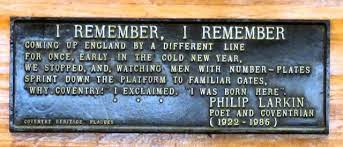Note: If you wish to receive, via e-mail, (1) my weekly newsletter or (2) daily copies of these posts, notify me at rrbates1951@gmail.com and indicate which you would like. I promise not to share your e-mail address with anyone. To unsubscribe, send me a follow-up email.
Wednesday
Visiting my cousin John Beech in Coventry, England after two weeks of ancestor-searching with Julia, I learned about a Phil Larkin plaque in a local railway station. On it is the opening stanza of “I Remember, I Remember”:
Coming up England by a different line
For once, early in the cold new year,
We stopped, and, watching men with number plates
Sprint down the platform to familiar gates,
“Why, Coventry!” I exclaimed. “I was born here.”
For all that it celebrates Larkin, however, the plaque gives a false impression of the poet’s actual feelings about Coventry. Rather than experiencing nostalgia, the poet is cranky and sarcastic and essentially goes on to say, “I was born here? Big frickin’ deal!”
Indeed, at one point in the poem, Larkin’s interlocutor says, “You look as though you wished the place in Hell, judging from your face.”
His friend is prepared to hear a sentimental account of a childhood spent in Coventry, only to get the exact opposite. In other words, the excerpted stanza implies sentiments that the poet attacks. Not all people are sentimental about their family roots, we learn—which, for all we know, was also true of Julia’s ancestors, those Joneses and Pickens who emigrated to the United States.
Larkin’s starting point is a poem by the Victorian poet Thomas Hood entitled “I Remember, I Remember,” which Larkin appropriates but only so that he can attack the poem’s vision. When he recalls his childhood in Coventry, he arrives at a list of things that did not happen. For instance,
–he was not a child prodigy that invented “blinding theologies of flowers and fruits”;
–there was not some “splendid family” that he ran to when he got depressed, a family that had muscular boys, full chested girls, a car he could drive, and a farm where he could grow into himself;
–he never had a romantic encounter with a girl in the bracken;
–his poetry was not printed in the local newspaper, nor did he receive early recognition.
In short, nothing memorable happened in his Coventry childhood, leading him to say, “Oh well, I suppose it’s not the place’s fault.”
And then:
Nothing, like something, happens anywhere.
So Coventry might just as well be anywhere else. Here’s the poem:
I Remember, I Remember
By Philip Larkin
Coming up England by a different line
For once, early in the cold new year,
We stopped, and, watching men with number plates
Sprint down the platform to familiar gates,
“Why, Coventry!” I exclaimed. “I was born here.”I leant far out, and squinnied for a sign
That this was still the town that had been ‘mine’
So long, but found I wasn’t even clear
Which side was which. From where those cycle-crates
Were standing, had we annually departedFor all those family hols? . . . A whistle went:
Things moved. I sat back, staring at my boots.
‘Was that,’ my friend smiled, ‘where you “have your roots”?’
No, only where my childhood was unspent,
I wanted to retort, just where I started:By now I’ve got the whole place clearly charted.
Our garden, first: where I did not invent
Blinding theologies of flowers and fruits,
And wasn’t spoken to by an old hat.
And here we have that splendid familyI never ran to when I got depressed,
The boys all biceps and the girls all chest,
Their comic Ford, their farm where I could be
‘Really myself’. I’ll show you, come to that,
The bracken where I never trembling sat,Determined to go through with it; where she
Lay back, and ‘all became a burning mist’.
And, in those offices, my doggerel
Was not set up in blunt ten-point, nor read
By a distinguished cousin of the mayor,Who didn’t call and tell my father There
Before us, had we the gift to see ahead –
‘You look as though you wished the place in Hell,’
My friend said, ‘judging from your face.’ ‘Oh well,
I suppose it’s not the place’s fault,’ I said.‘Nothing, like something, happens anywhere.’
If we go by what his friend sees in his face, the speaker’s “oh well” masks a deep resentment. He’s mad at Coventry because it did not give him the cliched childhood of someone who would become famous. In fact, the more he thinks about it, the madder he becomes for not having had such a childhood. It’s not Coventry he’s mad at but “anywhere.” Had he been born somewhere else, he would be just as angry.
So I guess that lets Coventry off the hook. And perhaps Larkin would appreciate the city finally getting around to saying, “There before us, had we the gift to see ahead, was a genius, and we didn’t even know it.” Would the plaque and other publicity material assuage his hurt feelings?
Even if they did, with Larkin being Larkin I can’t imagine him admitting it.


